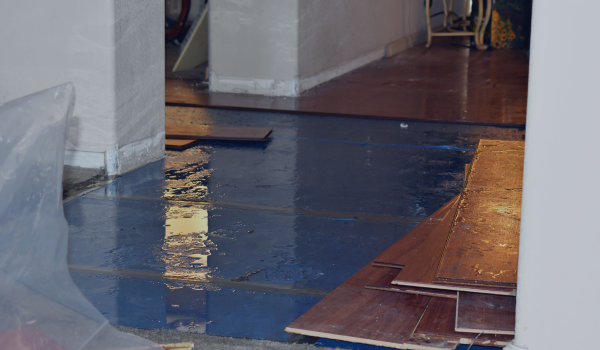Your homeowners insurance safeguards you against financial loss in the event your home and belongings are damaged. It also covers you if you’re found liable for an accident on your property. So, what does this have to do with the COVID-19 pandemic?
COVID-19 has affected nearly every aspect of daily life. It’s impacting businesses across multiple industries and changing the landscape for many types of insurance.
But what about homeowners insurance?
The virus itself doesn’t have much of an impact on homeowners insurance. But, the fallout may. People are spending more time at home working and schooling their kids. It’s a good time to double check and make any necessary changes to your insurance coverage.
Also, if you find yourself needing to make a claim, the claims process may have changed. Your insurance company may not be sending claims adjusters into the field. Insurers are moving toward an online claims process during the pandemic. That means you will be recording damage via photo and/or video and submitting evidence to the company online.
Read on to learn more about:
- How COVID-19 and related lifestyle changes might affect your needs for homeowners insurance coverage
- How COVID-19 could impact your insurance claims
- How insurers are responding and adapting to the pandemic
Your Homeowners Insurance Coverage Needs
Coronavirus doesn’t impact personal property, so it’s unlikely that you will need to make any changes to your property coverage. However, the virus does impact the amount of time that people spend at home, and more time at home means more potential for accidents. You may find that you need more, or different, liability coverage.
Many people are at home working remotely for the first time. This arrangement often translates to more business assets under your personal roof. If you fall into this category, a home business endorsement might be necessary to cover your work assets, like computers and other equipment.
If you rent out a property or a room on home sharing apps like Airbnb, it’s very likely that travel restrictions and social distancing are keeping people from using your vacation rental. You should be able to temporarily halt your coverage until you need it again.
Let’s explore each of these in more depth.
Liability Coverage
If anyone in your household, including pets, causes damage to someone else’s property, then your personal liability coverage will protect you.
Now that your neighbors and kids are home from work and school, more people are out walking around. It’s even more important that you take measures to protect yourself.
Look around your property and consider what might attract a child who’s out wandering the neighborhood. Do you have a pool? A backyard swing set that’s not fully fenced? A dog that sits outside on a leash or in a run? Any of those could result in an accident that exposes you to liability.
Adults could get hurt on your property as well.
A dog out for a walk might decide to follow a scent, causing someone to trip and fall. You never know what will happen. So, it’s a good idea to have at least $300,000 of personal liability coverage on your home insurance policy.
If you do have a pet, find out whether you’re covered for animal related damages. Some policies exclude certain breeds.
Home Business Equipment Coverage
If COVID-19 has you working from home, find out how much of your business property is covered under your homeowners policy. Most policies only cover $2,500 for business equipment, and you may have more in your makeshift home office.
Fortunately, many insurers offer business equipment endorsements to protect your work equipment. These endorsements give you up to $5,000, and in some cases up to $10,000 of coverage. Call your agent to find out your options for increasing your business equipment limit.
Short-Term Rental Coverage
Do you have a room or second property that you rent out through Airbnb, VRBO, or a similar company? Unless you rent regularly enough to need business coverage, your coverage probably takes the form of an endorsement or rider on your regular policy.
There’s a good chance that you’re not using that coverage right now and won’t need it for a while. Ask your insurer if you can pause the coverage until you need it again.
How COVID-19 Impacts Homeowners Insurance Claims
Even before the coronavirus pandemic, online and automated claims processing started to become a trend. Now, social distancing means that it’s no longer an option for most people to have an adjuster come to their homes, so virtual claims are the new norm.
Much of the claims process is the same. The primary difference is that, after you file a claim, you won’t wait for someone to come inspect the damage. Instead, you write up a report in your own words, make a list of what was damaged or stolen, and take photos or videos as evidence of the damage. Then you’ll submit your report and evidence virtually and await your reimbursement.
Insurers might still insist on sending adjusters for larger claims, but you can expect that to happen less frequently.
How Are Home Insurance Companies Responding?
Online claims adjustment isn’t the only process that insurers are changing during the crisis. Some are offering financial aid and forgiveness to customers who are experiencing financial difficulties due to closures and cancellations.
In California, Insurance Commissioner Ricardo Lara has called for companies to offer a minimum 60-day grace period for payments. Pennsylvania, Wisconsin, and several other states are also asking insurers to waive late charges and extend grace periods. David Sampson of the American Property Casualty Insurance Association (APCIA) has asked all insurers nationwide to be similarly flexible and to relax deadlines around claims filing.
Many companies in the homeowners insurance space are extending inspection deadlines in cases where homes require repairs for policies to remain in place. Insurance company representatives may be working from home, but policyholders shouldn’t expect disruptions in service.
These are industry-wide guidelines and patterns, but every insurer will be making its own decisions. If anything about your coverage is in question, give us a call. We are standing by and fully operational to provide you with customer support.



